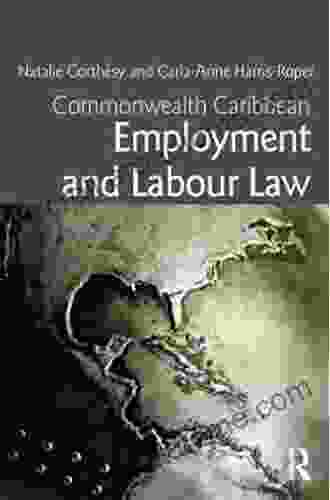Unlocking the Nexus of Employment and Labour Law in the Commonwealth Caribbean

The Caribbean is an archipelago of over 7,000 islands, with a population of over 40 million people. The Commonwealth Caribbean, which comprises 15 independent states and 6 overseas territories, is a sub-region of the Caribbean with a rich history and culture.
The Commonwealth Caribbean is a diverse region, with countries at different stages of economic development. Some countries, such as Barbados and Trinidad and Tobago, have relatively developed economies, while others, such as Haiti and Dominica, are among the poorest countries in the world.
Despite their diversity, the Commonwealth Caribbean countries share a number of common challenges, including high unemployment, poverty, and inequality. These challenges are often compounded by natural disasters, such as hurricanes and earthquakes.
4.4 out of 5
| Language | : | English |
| File size | : | 8935 KB |
| Text-to-Speech | : | Enabled |
| Enhanced typesetting | : | Enabled |
| Word Wise | : | Enabled |
| Print length | : | 506 pages |
In recent years, there has been a growing recognition of the importance of employment and labour law in addressing these challenges. Employment and labour law can help to protect workers' rights, promote decent work, and contribute to economic development.
This article provides an overview of the employment and labour law framework in the Commonwealth Caribbean. It begins by examining the historical roots of labour law in the region. It then discusses the current legal framework governing employment relations, including the role of trade unions and industrial relations. Finally, the article considers the challenges and opportunities facing labour law in the Commonwealth Caribbean in the 21st century.
The history of labour law in the Commonwealth Caribbean is closely linked to the region's colonial past. During the colonial period, the Caribbean was a major producer of sugar, coffee, and other agricultural commodities. The plantation economy relied on the labour of enslaved Africans and indentured labourers from India and China.
The working conditions on the plantations were often harsh and exploitative. In the 19th century, there were a number of slave revolts and labour unrest in the Caribbean. These revolts led to the abolition of slavery in the British Caribbean in 1838. However, the conditions of workers on the plantations remained poor.
In the early 20th century, there was a growing movement for labour reform in the Caribbean. This movement was led by trade unions and political activists. In 1938, the British government appointed a Royal Commission to investigate labour conditions in the Caribbean. The Commission's report, published in 1945, recommended a number of reforms, including the of minimum wages, paid holidays, and social security benefits.
These reforms were gradually implemented in the Caribbean colonies in the post-war period. In 1962, Jamaica became the first Commonwealth Caribbean country to gain independence. Other countries followed suit in the 1960s and 1970s.
After independence, the Commonwealth Caribbean countries continued to develop their own labour laws. These laws were influenced by a number of factors, including the International Labour Organization (ILO) conventions, the British common law tradition, and the experience of other developing countries.
The legal framework governing employment relations in the Commonwealth Caribbean is complex and varies from country to country. However, there are a number of common features.
Contracts of Employment
Contracts of employment are the foundation of the employment relationship. They set out the terms and conditions of employment, including the employee's salary, benefits, and working hours.
In most Commonwealth Caribbean countries, contracts of employment are not required to be in writing. However, it is good practice to have a written contract in place. This helps to avoid disputes and misunderstandings.
Minimum Wages
Minimum wages are set by law in all Commonwealth Caribbean countries. The minimum wage varies from country to country, but it is typically around US$5 per hour.
Hours of Work
The standard working week in the Commonwealth Caribbean is 40 hours. However, some employees may be required to work overtime, especially in certain industries. Overtime is typically paid at a higher rate than normal wages.
Paid Leave
All employees in the Commonwealth Caribbean are entitled to paid leave. The amount of paid leave varies from country to country, but it is typically around 15 days per year.
Social Security
All employees in the Commonwealth Caribbean are required to contribute to social security. Social security provides benefits such as pensions, disability benefits, and maternity benefits.
Trade Unions
Trade unions play an important role in the Commonwealth Caribbean. Trade unions represent workers in negotiations with employers over wages, benefits, and working conditions. Trade unions also provide a range of services to their members, such as legal advice, training, and financial assistance.
Industrial Relations
Industrial relations are the relations between employers and trade unions. Industrial relations can be complex and conflictual. However, there are a number of mechanisms in place to promote harmonious industrial relations, such as collective bargaining and mediation.
The Commonwealth Caribbean faces a number of challenges in the 21st century. These challenges include:
- High Unemployment: Unemployment is a major problem in the Commonwealth Caribbean. The unemployment rate varies from country to country, but it is typically around 10%. Unemployment is particularly high among young people.
- Poverty: Poverty is another major problem in the Commonwealth Caribbean. The poverty rate varies from country to country, but it is typically around 20%. Poverty is often concentrated in rural areas and among vulnerable groups, such as women and children.
- Inequality: Inequality is a growing problem in the Commonwealth Caribbean. The gap between the rich and the poor is widening. Inequality is often linked to factors such as race, gender, and class.
- Climate Change: Climate change is a major threat to the Commonwealth Caribbean. Climate change is causing more frequent and severe hurricanes, floods, and droughts. These events can have a devastating impact on the economy and on the lives of people in the region.
Despite these challenges, there are also a number of opportunities for labour law in the Commonwealth Caribbean. These opportunities include:
- Economic Growth: The Commonwealth Caribbean has experienced strong economic growth in recent years. This growth has led to an increase in employment opportunities.
- Regional Integration: The Commonwealth Caribbean is increasingly integrated economically and politically. This integration is creating new opportunities for workers to move between countries and to access new jobs.
- Technological Change: Technological change is transforming the world of work. This change is creating new opportunities for workers, but it is also posing new challenges. Labour law can help to ensure that workers are protected from the negative effects of technological change.
The Commonwealth Caribbean is facing a number of challenges in the 21st century. However, there are also a number of opportunities for labour law to help improve the lives of workers in the region. By working together, governments, trade unions, and employers can create a more just and equitable Commonwealth Caribbean.
Employment and labour law play a vital role in the Commonwealth Caribbean. Labour law can help to protect workers' rights, promote decent work, and contribute to economic development. The Commonwealth Caribbean faces a number of challenges in the 21st century,
4.4 out of 5
| Language | : | English |
| File size | : | 8935 KB |
| Text-to-Speech | : | Enabled |
| Enhanced typesetting | : | Enabled |
| Word Wise | : | Enabled |
| Print length | : | 506 pages |
Do you want to contribute by writing guest posts on this blog?
Please contact us and send us a resume of previous articles that you have written.
 Book
Book Novel
Novel Page
Page Chapter
Chapter Text
Text Story
Story Genre
Genre Reader
Reader Library
Library Paperback
Paperback E-book
E-book Magazine
Magazine Newspaper
Newspaper Paragraph
Paragraph Sentence
Sentence Bookmark
Bookmark Shelf
Shelf Glossary
Glossary Bibliography
Bibliography Foreword
Foreword Preface
Preface Synopsis
Synopsis Annotation
Annotation Footnote
Footnote Manuscript
Manuscript Scroll
Scroll Codex
Codex Tome
Tome Bestseller
Bestseller Classics
Classics Library card
Library card Narrative
Narrative Biography
Biography Autobiography
Autobiography Memoir
Memoir Reference
Reference Encyclopedia
Encyclopedia Carolyn Marsden
Carolyn Marsden Jean Bertrand Aristide
Jean Bertrand Aristide Carolyn Lee
Carolyn Lee Carol Deppe
Carol Deppe Cassandra Gaisford
Cassandra Gaisford Tim Daly
Tim Daly Frances West
Frances West Per Bech
Per Bech Casey Rosenthal
Casey Rosenthal Matthew Pottage
Matthew Pottage Carmen Gonzalez Ms Ed
Carmen Gonzalez Ms Ed Greg Proops
Greg Proops Mike Turner
Mike Turner Kathy D Blaney
Kathy D Blaney William Ambrose Spicer
William Ambrose Spicer Camille Paige
Camille Paige Carlen Maddux
Carlen Maddux Burton Richter
Burton Richter Marcel Danesi
Marcel Danesi Bronson Dant
Bronson Dant
Light bulbAdvertise smarter! Our strategic ad space ensures maximum exposure. Reserve your spot today!

 Ross NelsonWeight Loss That Works For You: The Ultimate Guide to Achieving Your Health...
Ross NelsonWeight Loss That Works For You: The Ultimate Guide to Achieving Your Health...
 Camden MitchellUnlocking the Secrets of Karma: A Comprehensive Guide for Spiritual Growth
Camden MitchellUnlocking the Secrets of Karma: A Comprehensive Guide for Spiritual Growth Craig CarterFollow ·9.8k
Craig CarterFollow ·9.8k Luke BlairFollow ·3.8k
Luke BlairFollow ·3.8k Dakota PowellFollow ·7.8k
Dakota PowellFollow ·7.8k Ernest PowellFollow ·19.9k
Ernest PowellFollow ·19.9k Mario BenedettiFollow ·18.2k
Mario BenedettiFollow ·18.2k Edward BellFollow ·5k
Edward BellFollow ·5k Floyd PowellFollow ·15.8k
Floyd PowellFollow ·15.8k Eric HayesFollow ·8.5k
Eric HayesFollow ·8.5k

 Shawn Reed
Shawn ReedEmbark on a Transformative Journey: Discover Ritual...
Delve into the Enigmatic World of...

 Connor Mitchell
Connor MitchellUnleash Your Soul: A Journey to Less Noise, More Soul
Embrace the Power of Silence...

 Derek Cook
Derek CookRitual Theory, Ritual Practice: Unlocking the Secrets of...
Rituals have been an...

 Evan Hayes
Evan HayesStop the Itch: Simple Steps to Lasting Relief
Itching, an...

 Herman Mitchell
Herman MitchellThe Ultimate Premarital Guide: Your Essential Wedding...
Congratulations on your engagement! This is...

 DeShawn Powell
DeShawn PowellUnlocking the Enigma of the Mantle: A Deep Dive into "The...
Our planet,...
4.4 out of 5
| Language | : | English |
| File size | : | 8935 KB |
| Text-to-Speech | : | Enabled |
| Enhanced typesetting | : | Enabled |
| Word Wise | : | Enabled |
| Print length | : | 506 pages |








